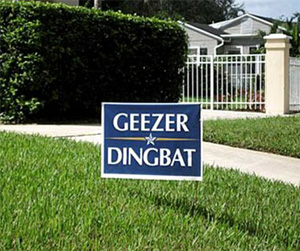 Condominium owners feel they have a right to do whatever they like on their own property, but homeowners associations seldom agree. Thus, the seemingly unending fights between them continue; but residents are now taking their fights all the way to the Supreme Court – and winning.
Condominium owners feel they have a right to do whatever they like on their own property, but homeowners associations seldom agree. Thus, the seemingly unending fights between them continue; but residents are now taking their fights all the way to the Supreme Court – and winning.
In 2005, condominium owner Wasim Khan placed political signs supporting his own candidacy for the Morris County Board of Freeholders in his window and front door. He was asked by his association, Mazdabrook Commons HOA, to remove the signs, which he did. Later, in an unrelated lawsuit brought against him by the HOA, Khan filed a countersuit stating the HOA had previously violated his First Amendment rights by insisting he take down the signs during his candidacy.
Initially, the trial court, in a decision based on Committee for a Better Twin Rivers v. Twin Rivers Homeowners’ Association, 192 N.J. 344 (2007) ruled the HOA’s sign prohibition was not a violation of Khan’s First Amendment rights. After a series of appeals by both Khan and the association, the New Jersey Supreme Court upheld an Appellate Division’s decision that Khan’s First Amendment rights were violated.
The Supreme Court essentially ruled that associations cannot ban an owner’s right to post political signs on their own property even when the property is subject to HOA rules and regulations. However, HOAs maintain the right to enforce certain restrictions on signs, such as limiting the number, size or location. In addition, HOAs must have written criteria for sign postings included in their bylaws prior to enforcement.
The New Jersey Supreme Court’s decision did not address the issue of posting signs in common areas.
Similarly, an Orleans, Massachusetts condo owner, Steven Preu, had been fighting with his association board when he decided to place bags of dog feces on the property with the name of the association president, Gerard Ritzinger, on them. According to Preu, Ritzinger had only allowed his dog to release himself in restricted areas. In another dispute with the board, Preu took to expressing himself by placing handwritten signs in the trash room – a clear violation of association rules and regulations.
The condo association sued Preu for violating the rules. Preu fought back asserting his signs were a form of communication which was protected under the First Amendment. Both the Massachusetts trial court and Appeals court agreed with Preu that his signs were a form of communication protected by the First Amendment.
In the case of Board of Managers of Old Colony Village Condominium v. Preu, the ruling was not so cut and dry as with the Khan vs. Mazdabrook Commons HOA case. The Massachusetts Appellate court made it clear that the ruling was not solely based on a freedom of speech issue rather, “We do not hold condominium restrictions on speech and expressive conduct may never be enforceable, nor that expenses incurred in addressing their violation may never be shifted to the unit owner under the statute. We hold only that when an action is brought claiming the breach of such restrictions amounting to conduct entitling a plaintiff to shift costs under … [state law] … , the restrictions are subject to scrutiny under the First Amendment.”

There is no shortage of cases involving owners battling their associations, particularly in cases claiming freedom of speech issues. But do renters have the same rights to political free speech via property signs?
The California Association of Realtors, California Apartments Association and other local apartment associations all say no. According to these groups, only owners and property managers should have the say over what is displayed on the property - in the interest of quiet enjoyment for all.
California lawmakers disagreed, and in 2011 passed a bill (SB 337) introduced by former California State Senator Christine Kehoe, which transferred owner’s freedom of speech rights to tenants, to post non-commercial signs in their own dwellings.
To be clear, the new law provides the same protection to tenants as currently afforded to home owners as it relates to the ability to post political and other non-commercial signs on their rented property. Tenants are therefore subject to any homeowners- or condominium associations’ rules and regulations regarding time, size and common area placement restrictions.
Despite these high-profile cases however, most states have remained largely silent on this issue.
Tell us what you think: Do you agree with the decisions of the Appellate and Supreme courts in these decisions about signs being protected by the First Amendment? As landlords and property managers do you allow signs on your property(s)?